初二下Unit5知识点
- 格式:doc
- 大小:168.00 KB
- 文档页数:11
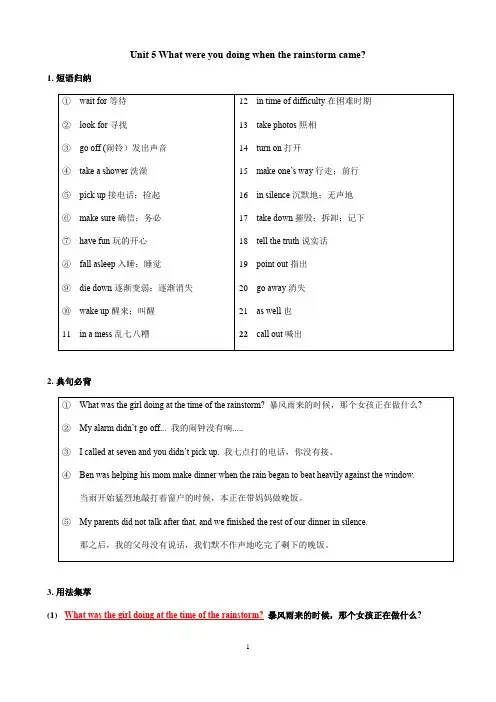
Unit 5 What were you doing when the rainstorm came?1.短语归纳2.典句必背3.用法集萃(1)What was the girl doing at the time of the rainstorm?暴风雨来的时候,那个女孩正在做什么?❖本句是特殊疑问句,时态是过去进行时,结构是“What+was/were+主语+doing+其他?”,用于询问某人在过去的某个时间正在做的事情。
例:—What were you doing at nine o’clock yesterday evening? 昨天晚上九点你正在做什么?—I was watching TV at home. 我正在家里看电视。
❖拓展:过去进行时描述过去某个时刻正在发生的动作或存在的状态,结构是“was/ were+动词的现在分词”。
例:When I got home my mother was cooking. 我到家的时候我妈妈正在做饭(2)My alarm didn’t go off... 我的闹钟没有响.....❖go off意为“(闹钟)发出响声”例:My alarm goes off at six every morning. 我的闹钟每天早晨6点响。
❖归纳:go off还有“离开”和“变质”之意。
例:Bob went off to get a drink. 鲍勃拿饮料去了。
Meat goes off quickly in hot weather. 热天肉变质得快。
❖拓展:go的短语(3)I called at seven and you didn’t pick up. 我七点打的电话,你没有接。
❖pick up意为“接电话”。
pick up有如下含义:(4)I called again at eight and you didn’t answer then either. 我八点再打来,你也没接。
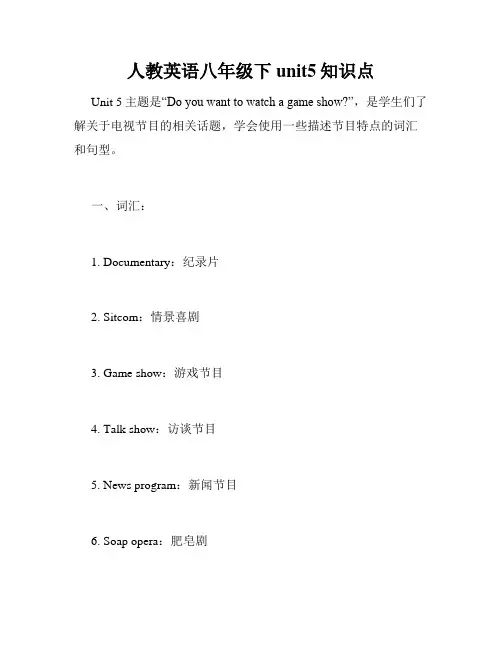
人教英语八年级下unit5知识点Unit 5主题是“Do you want to watch a game show?”,是学生们了解关于电视节目的相关话题,学会使用一些描述节目特点的词汇和句型。
一、词汇:1. Documentary:纪录片2. Sitcom:情景喜剧3. Game show:游戏节目4. Talk show:访谈节目5. News program:新闻节目6. Soap opera:肥皂剧7. Sports show:体育节目8. Weather report:天气预报9. Advertisement:广告二、句型:1. What’s your favourite TV show?你最喜欢的电视节目是什么?2. I like watching documentaries because they are informative.我喜欢看纪录片,因为它们有启发性。
3. Do you prefer soap operas or sitcoms?你喜欢肥皂剧还是情景喜剧?4. I find game shows entertaining because they are fun to watch.我发现游戏节目很有趣,因为观看时非常有趣。
5. My sister loves talk shows because she enjoys listening to people’s opinions.我姐姐喜欢听访谈节目,因为她喜欢倾听别人的意见。
6. Sports shows are exciting to watch because you never know what is going to happen.体育节目很刺激,因为你永远不知道会发生什么。
7. I don't like advertisements because they are boring.我不喜欢广告,因为它们很无聊。
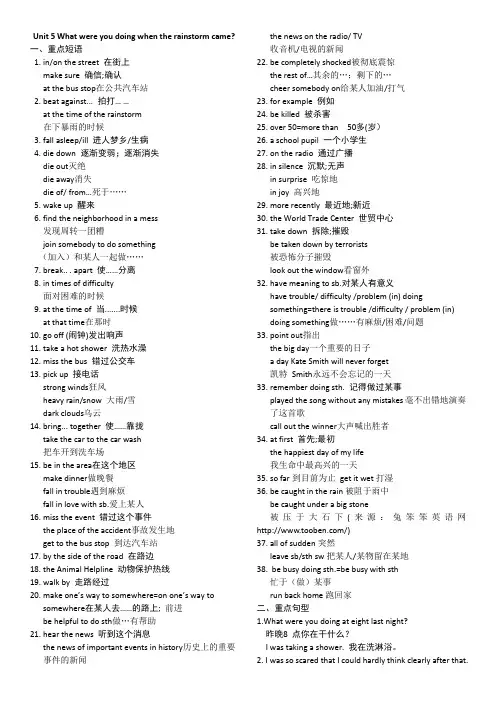
Unit 5 What were you doing when the rainstorm came?一、重点短语1. in/on the street 在街上make sure 确信;确认at the bus stop在公共汽车站2. beat against... 拍打… …at the time of the rainstorm在下暴雨的时候3. fall asleep/ill进人梦乡/生病4. die down 逐渐变弱;逐渐消失die out灭绝die away消失die of/ from…死于……5. wake up 醒来6. find the neighborhood in a mess发现周转一团糟join somebody to do something(加入)和某人一起做……7. break.. . apart 使……分离8. in times of difficulty面对困难的时候9. at the time of 当.......时候at that time在那时10. go off (闹钟)发出响声11. take a hot shower 洗热水澡12. miss the bus 错过公交车13. pick up 接电话strong winds狂风heavy rain/snow 大雨/雪dark clouds乌云14. bring... together 使……靠拢take the car to the car wash把车开到洗车场15. be in the area在这个地区make dinner做晚餐fall in trouble遇到麻烦fall in love with sb.爱上某人16. miss the event 错过这个事件the place of the accident事故发生地get to the bus stop 到达汽车站17. by the side of the road 在路边18. the Animal Helpline 动物保护热线19. walk by 走路经过20. make one’s way to somewhere=on one’s way tosomewhere在某人去……的路上; 前进be helpful to do sth做…有帮助21. hear the news 听到这个消息the news of important events in history历史上的重要事件的新闻the news on the radio/ TV收音机/电视的新闻22. be completely shocked被彻底震惊the rest of…其余的…;剩下的…cheer somebody on给某人加油/打气23. for example 例如24. be killed 被杀害25. over 50=more than 50多(岁)26. a school pupil 一个小学生27. on the radio 通过广播28. in silence 沉默;无声in surprise 吃惊地in joy 高兴地29. more recently 最近地;新近30. the World Trade Center 世贸中心31. take down 拆除;摧毁be taken down by terrorists被恐怖分子摧毁look out the window看窗外32. have meaning to sb.对某人有意义have trouble/ difficulty /problem (in) doingsomething=there is trouble /difficulty / problem (in)doing something做……有麻烦/困难/问题33. point out指出the big day一个重要的日子a day Kate Smith will never forget凯特Smith永远不会忘记的一天33. remember doing sth. 记得做过某事played the song without any mistakes毫不出错地演奏了这首歌call out the winner大声喊出胜者34. at first 首先;最初the happiest day of my life我生命中最高兴的一天35. so far到目前为止get it wet打湿36. be caught in the rain被阻于雨中be caught under a big stone被压于大石下(来源:兔笨笨英语网/)37. all of sudden突然leave sb/sth sw把某人/某物留在某地38.be busy doing sth.=be busy with sth忙于(做)某事run back home跑回家二、重点句型1.What were you doing at eight last night?昨晚8 点你在干什么?I was taking a shower. 我在洗淋浴。
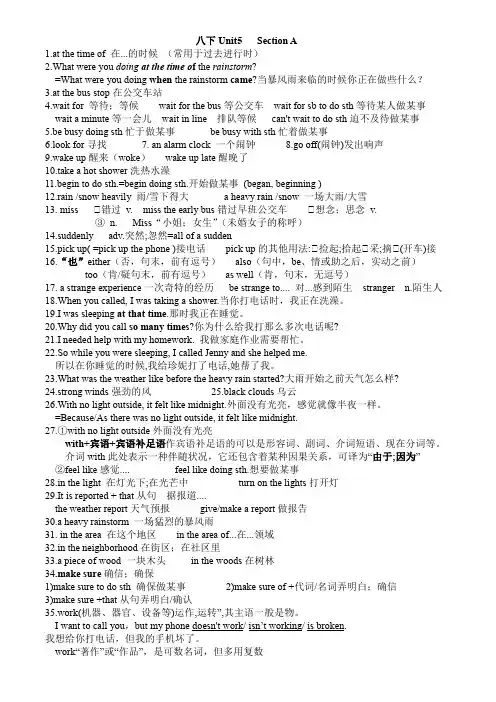
八下Unit5 Section A1.at the time of 在...的时候(常用于过去进行时)2.What were you doing at the time o f the rainstorm?=What were you doing when the rainstorm came?当暴风雨来临的时候你正在做些什么?3.at the bus stop在公交车站4.wait for 等待;等候wait for the bus等公交车wait for sb to do sth等待某人做某事wait a minute等一会儿wait in line 排队等候can't wait to do sth迫不及待做某事5.be busy doing sth忙于做某事be busy with sth忙着做某事6.look for寻找7. an alarm clock 一个闹钟8.go off(闹钟)发出响声9.wake up醒来(woke)wake up late醒晚了10.take a hot shower洗热水澡11.begin to do sth.=begin doing sth.开始做某事(began, beginning )12.rain /snow heavily 雨/雪下得大 a heavy rain /snow 一场大雨/大雪13. miss ①错过v. miss the early bus错过早班公交车①想念;思念v.③n. Miss“小姐;女生”(未婚女子的称呼)14.suddenly adv.突然;忽然=all of a sudden15.pick up( =pick up the phone )接电话pick up的其他用法:①捡起;拾起①采;摘①(开车)接16.“也”either(否,句末,前有逗号)also(句中,be、情或助之后,实动之前)too(肯/疑句末,前有逗号)as well(肯,句末,无逗号)17. a strange experience一次奇特的经历be strange to.... 对...感到陌生stranger n.陌生人18.When you called, I was taking a shower.当你打电话时,我正在洗澡。
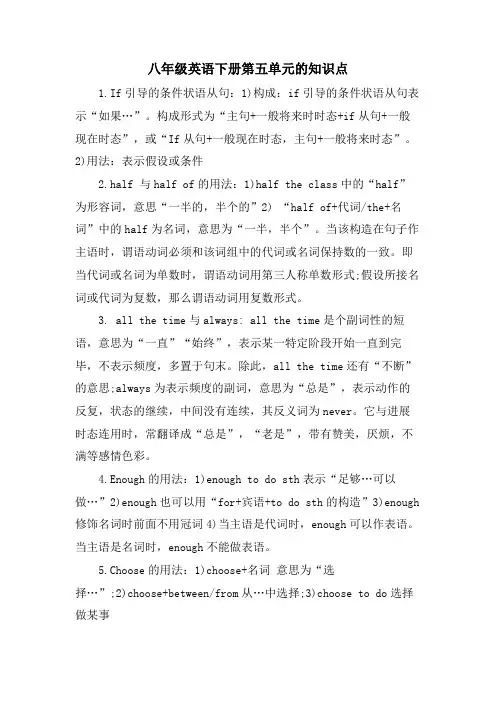
八年级英语下册第五单元的知识点1.If引导的条件状语从句:1)构成:if引导的条件状语从句表示“如果…”。
构成形式为“主句+一般将来时时态+if从句+一般现在时态”,或“If从句+一般现在时态,主句+一般将来时态”。
2)用法:表示假设或条件2.half 与half of的用法:1)half the class中的“half”为形容词,意思“一半的,半个的”2) “half of+代词/the+名词”中的half为名词,意思为“一半,半个”。
当该构造在句子作主语时,谓语动词必须和该词组中的代词或名词保持数的一致。
即当代词或名词为单数时,谓语动词用第三人称单数形式;假设所接名词或代词为复数,那么谓语动词用复数形式。
3. all the time与always: all the time是个副词性的短语,意思为“一直”“始终”,表示某一特定阶段开始一直到完毕,不表示频度,多置于句末。
除此,all the time还有“不断”的意思;always为表示频度的副词,意思为“总是”,表示动作的反复,状态的继续,中间没有连续,其反义词为never。
它与进展时态连用时,常翻译成“总是”,“老是”,带有赞美,厌烦,不满等感情色彩。
4.Enough的用法:1)enough to do sth表示“足够…可以做…”2)enough也可以用“for+宾语+to do sth的构造”3)enough 修饰名词时前面不用冠词4)当主语是代词时,enough可以作表语。
当主语是名词时,enough不能做表语。
5.Choose的用法:1)choose+名词意思为“选择…”;2)choose+between/from从…中选择;3)choose to do选择做某事6.Exercise的用法:1)运动,锻炼,是不可数名词2)体操,练习,是可数名词。
3)动词,使….运动7.wear, put on, have on, dress: wear“穿着”“戴着”,表示状态,是延续性动词,一般现在时表示经常状态,现在进展时表示暂时状态;put on“穿上”“戴上”,表示动作,是非延续性动词;have on“穿着”“戴着”,表示状态可以与wear互换;dress“穿上”“穿着”,既表示状态,也表示动作,既可以作及物动词,也可以作不及物动词。
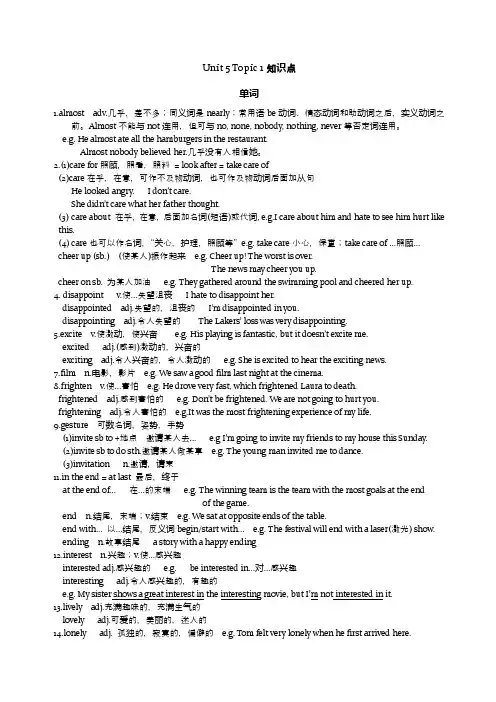
Unit 5 Topic 1知识点单词1.almost adv.几乎,差不多;同义词是nearly;常用语be动词、情态动词和助动词之后,实义动词之前。
Almost不能与not连用,但可与no, none, nobody, nothing, never等否定词连用。
e.g. He almost ate all the hamburgers in the restaurant.Almost nobody believed her.几乎没有人相信她。
2.(1)care for照顾,照看,照料= look after = take care of(2)care在乎,在意,可作不及物动词,也可作及物动词后面加从句He looked angry. I don’t care.She didn’t care what her father thought.(3)care about 在乎,在意,后面加名词(短语)或代词, e.g.I care about him and hate to see him hurt like this.(4)care也可以作名词,“关心,护理,照顾等”e.g. take care小心,保重;take care of ...照顾... cheer up (sb.) (使某人)振作起来 e.g. Cheer up! The worst is over.The news may cheer you up.cheer on sb. 为某人加油 e.g. They gathered around the swimming pool and cheered her up.4.disappoint v.使...失望沮丧I hate to disappoint her.disappointed adj.失望的,沮丧的I’m disappointed in you.disappointing adj.令人失望的The Lakers’ loss was very disappointing.5.excite v.使激动,使兴奋 e.g. His playing is fantastic, but it doesn’t excite me.excited adj.(感到)激动的,兴奋的exciting adj.令人兴奋的,令人激动的 e.g. She is excited to hear the exciting news.7.film n.电影,影片 e.g. We saw a good film last night at the cinema.8.frighten v.使...害怕 e.g. He drove very fast, which frightened Laura to death.frightened adj.感到害怕的 e.g. Don’t be frightened. We are not going to hurt you.frightening adj.令人害怕的 e.g.It was the most frightening experience of my life.9.gesture 可数名词,姿势,手势(1)invite sb to +地点邀请某人去... e.g I’m going to invite my friends to my house this Sunday.(2)invite sb to do sth.邀请某人做某事 e.g. The young man invited me to dance.(3)invitation n.邀请,请柬11.in the end = at last 最后,终于at the end of... 在...的末端 e.g. The winning team is the team with the most goals at the endof the game.end n.结尾,末端;v.结束 e.g. We sat at opposite ends of the table.end with... 以...结尾,反义词begin/start with... e.g. The festival will end with a laser(激光) show. ending n.故事结尾 a story with a happy ending12.interest n.兴趣;v.使...感兴趣interested adj.感兴趣的 e.g. be interested in...对...感兴趣interesting adj.令人感兴趣的,有趣的e.g. My sister shows a great interest in the interesting movie, but I’m not interested in it.13.lively adj.充满趣味的,充满生气的lovely adj.可爱的,美丽的,迷人的14.lonely adj. 孤独的,寂寞的,偏僻的 e.g. Tom felt very lonely when he first arrived here.alone adj. adv. 单独的(地) e.g. You shouldn’t leave a child alone in the house.15.main adj.主要的,重要的,在句中只可作定语 e.g.This is a busy main street.mainly adv.主要地,大部分地 e.g. I don’t go out much, mainly because I have to look after the kids.17.painting n.画 e.g. There was a large painting of his father on the wall.18.role n.角色play an important role in... 在...中起重要作用19.(1)seem+ adj. 看起来... e.g. She didn’t seem pleased.(2)seem +like... 看起来像... e.g. She seems like a nice girl.(3)It seems like/as if/ as though +从句看起来好像... e.g. It seems like you’re catching a cold.(4)seem to do sth. e.g. The rainbow seemed to end on the hillside(山坡).(5)seem + (to be)+ 名词/形容词 e.g. That seems not a bad idea.(6)It seems that+从句 e.g. It seemed that the people here were not as friendly as you.20.感官系动词(后面加形容词作表语): smell闻起来,taste尝起来,look看起来,sound听起来,feel 摸起来(主语是事物),感觉(主语是人)其它系动词:bee, get, go, turn, grow都有“变得”之意;stay, keep, remain都有“保持”之意;Be动词也是系动词。
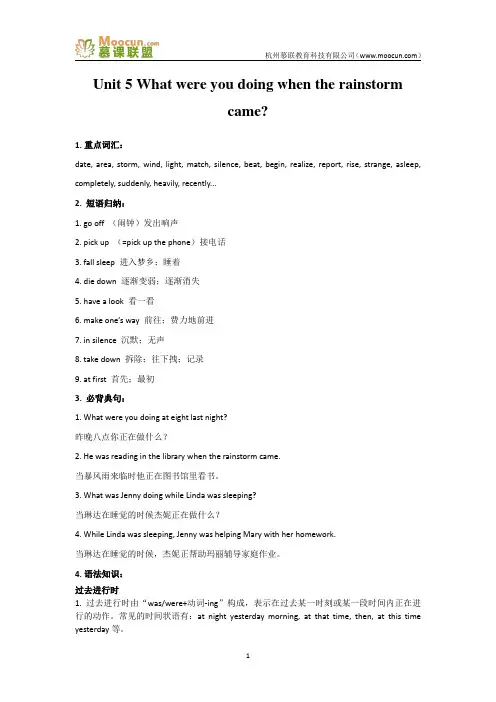
Unit 5 What were you doing when the rainstormcame?1.重点词汇:date, area, storm, wind, light, match, silence, beat, begin, realize, report, rise, strange, asleep, completely, suddenly, heavily, recently...2. 短语归纳:1. go off (闹钟)发出响声2. pick up (=pick up the phone)接电话3. fall sleep 进入梦乡;睡着4. die down 逐渐变弱;逐渐消失5. have a look 看一看6. make one’s way 前往;费力地前进7. in silence 沉默;无声8. take down 拆除;往下拽;记录9. at first 首先;最初3. 必背典句:1. What were you doing at eight last night?昨晚八点你正在做什么?2. He was reading in the library when the rainstorm came.当暴风雨来临时他正在图书馆里看书。
3. What was Jenny doing while Linda was sleeping?当琳达在睡觉的时候杰妮正在做什么?4. While Linda was sleeping, Jenny was helping Mary with her homework.当琳达在睡觉的时候,杰妮正帮助玛丽辅导家庭作业。
4.语法知识:过去进行时1. 过去进行时由“was/were+动词-ing”构成,表示在过去某一时刻或某一段时间内正在进行的动作。
常见的时间状语有:at night yesterday morning, at that time, then, at this time yesterday等。
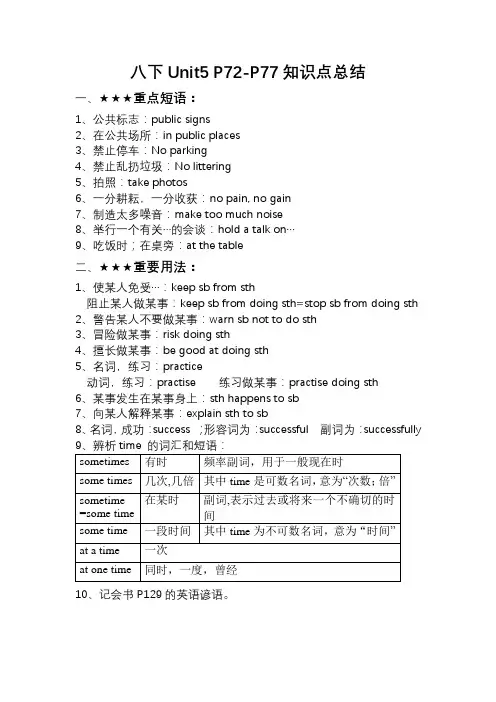
八下Unit5 P72-P77知识点总结
一、★★★重点短语:
1、公共标志:public signs
2、在公共场所:in public places
3、禁止停车:No parking
4、禁止乱扔垃圾:No littering
5、拍照:take photos
6、一分耕耘,一分收获:no pain, no gain
7、制造太多噪音:make too much noise
8、举行一个有关…的会谈:h old a talk on…
9、吃饭时;在桌旁:at the table
二、★★★重要用法:
1、使某人免受…:keep sb from sth
阻止某人做某事:keep sb from doing sth=stop sb from doing sth
2、警告某人不要做某事:warn sb not to do sth
3、冒险做某事:risk doing sth
4、擅长做某事:be good at doing sth
5、名词,练习:practice
动词,练习:practise 练习做某事:practise doing sth
6、某事发生在某事身上:sth happens to sb
7、向某人解释某事:explain sth to sb
8、名词,成功:success ;形容词为:successful 副词为:successfully
10、记会书P129的英语谚语。
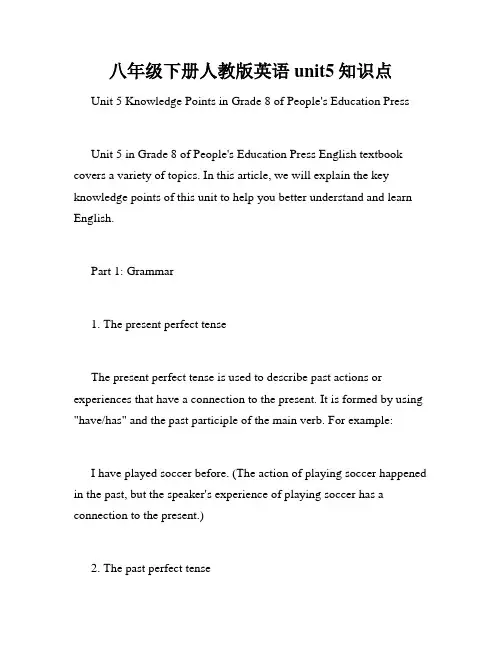
八年级下册人教版英语unit5知识点Unit 5 Knowledge Points in Grade 8 of People's Education PressUnit 5 in Grade 8 of People's Education Press English textbook covers a variety of topics. In this article, we will explain the key knowledge points of this unit to help you better understand and learn English.Part 1: Grammar1. The present perfect tenseThe present perfect tense is used to describe past actions or experiences that have a connection to the present. It is formed by using "have/has" and the past participle of the main verb. For example:I have played soccer before. (The action of playing soccer happened in the past, but the speaker's experience of playing soccer has a connection to the present.)2. The past perfect tenseThe past perfect tense is used to describe an action that happened before another action in the past. It is formed by using "had" and the past participle of the main verb. For example:She had finished her homework before she watched TV. (Finishing homework happened before watching TV in the past.)3. Passive voiceThe passive voice is used to show that the subject of the sentence is receiving the action, rather than doing the action. It is formed by using "be" and the past participle of the main verb. For example:The cake was made by Tom. (The subject "the cake" is receiving the action of being made by Tom.)Part 2: Vocabulary1. Adjectives for describing personalitiesIn unit 5, you will learn about various adjectives that can be used to describe personalities, such as:- Confident- Responsible- Outgoing- Shy- Friendly- Creative2. Phrasal verbsPhrasal verbs are idiomatic phrases that consist of a verb and one or more prepositions or adverbs. In unit 5, you will learn about some common phrasal verbs, such as:- Look up (to search for information)- Put on (to wear)- Take off (to remove)- Get along (to have a good relationship with someone)Part 3: Reading and Writing1. Writing a narrative paragraphIn unit 5, you will learn how to write a narrative paragraph, which tells a story or an event. A narrative paragraph should have a clear beginning, middle, and end, as well as detailed descriptions and sensory language to engage the reader.2. Reading comprehension strategiesReading comprehension strategies are techniques that help you better understand what you are reading. In unit 5, you will learn about some important strategies, such as:- Predicting- Visualizing- Summarizing- Asking questions- Making connectionsConclusionUnit 5 in Grade 8 of People's Education Press English textbook covers a diverse range of topics, including grammar, vocabulary, reading, and writing. By mastering the key knowledge points of this unit, you will have a better understanding of English and be able to communicate more effectively.。
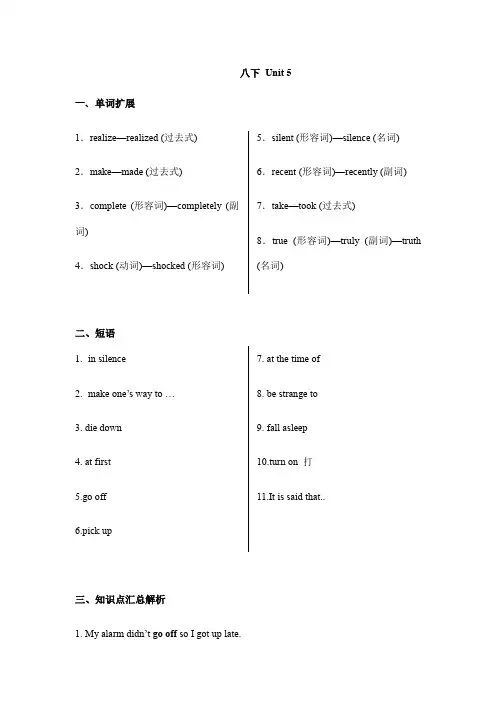
八下Unit 5一、单词扩展1.realize—realized (过去式) 2.make—made (过去式) 3.complete (形容词)—completely (副词)4.shock (动词)—shocked (形容词)5.silent (形容词)—silence (名词) 6.recent (形容词)—recently (副词) 7.take—took (过去式)8.true (形容词)—truly (副词)—truth (名词)二、短语1.in silence2.make one’s way to …3. die down4. at first5.go off6.pick up7. at the time of8. be strange to9. fall asleep10.turn on 打11.It is said that..三、知识点汇总解析1. My alarm didn’t go off so I got up late.2. I called at seven and you didn’t pick up.3.I called again at eight and you didn’t answer then either.4. That’s strange.5. With no ligh t outside, it felt like midnight.6. Ben was helping his mom make dinner when the rain began to beat heavily against the windows.7.He finally fell asleep when the wind was dying down at around 3:00 a.m.8.When he woke up, the sun was rising.9. My parents were completely shocked.10. My parents did not talk after that and we finished the rest of our dinner in silence.11. More recently, most Americans remember what they were doing when the world Trade Center in New York was taken down by terrorists.12. I didn’t believe him at first, b ut then I looked out of the window and realized that it was true.解析版1. My alarm didn’t go off so I got up late.go off ①(闹钟)发出响声①离开,走开①(食物)变质变坏①(水电等中断)2. I called at seven and you didn’t pick up.pick up ①捡起;拾起①搭载,(开车)接某人①学会,得到3.I called again at eight and you didn’t answer then either.either adv.也在本句中作副词,用于否定句中。
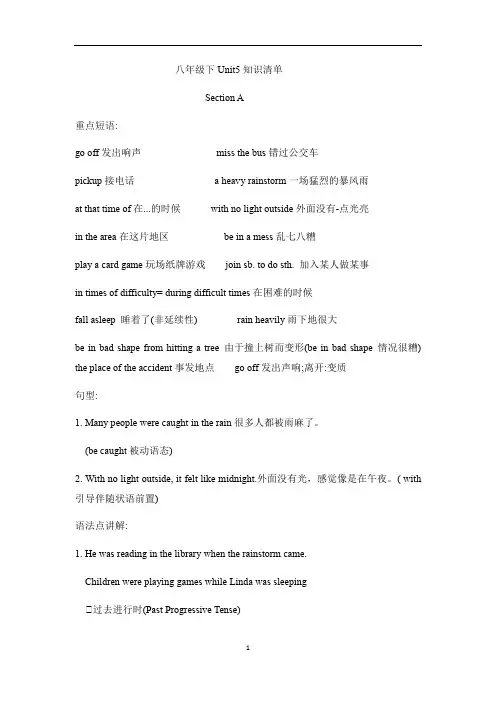
八年级下Unit5知识清单Section A重点短语:go off发出响声miss the bus错过公交车pickup接电话 a heavy rainstorm一场猛烈的暴风雨at that time of在...的时候with no light outside外面没有-点光亮in the area在这片地区be in a mess乱七八糟play a card game玩场纸牌游戏join sb. to do sth. 加入某人做某事in times of difficulty= during difficult times在困难的时候fall asleep 睡着了(非延续性) rain heavily雨下地很大be in bad shape from hitting a tree 由于撞上树而变形(be in bad shape 情况很糟) the place of the accident事发地点go off发出声响;离开:变质句型:1. Many people were caught in the rain很多人都被雨麻了。
(be caught被动语态)2. With no light outside, it felt like midnight.外面没有光,感觉像是在午夜。
( with 引导伴随状语前置)语法点讲解:1. He was reading in the library when the rainstorm came.Children were playing games while Linda was sleeping①过去进行时(Past Progressive Tense)定义:表示在过去某一时刻或某一段时间正在进行的动作。
这一特定的过去时间除有上下文暗示以外,一般用时间状语来表示。
构成: was\were+ v-ingI was taking a shower at 8 last night.He was reading in the library when the rainstorm came.Jenny was helping Mary with her homework while Linda was sleeping.①when和while在过去进行时态当中的区别while引导的时间状语从句,其谓语动词只能是延续的如work, watch,study... 而When其后既可跟延续性动词,也可跟非延续性动词,如come,go.while后常引导过去进行时态,when 后面常引导一般过去时。
人教版八年级下册英语Unit5知识点总结一、语法知识点A部分知识点1.过去进行时❶ 去进行时的构成及用法过去进行时由“助动词(was/were)+动词-ing”构成,表示在过去某一时刻或某一时间段正在进行的动作。
这一特定的过去时间除有上下文暗示以外,一般用过去的时间状语来表示。
如:then, at that time, at this time yesterday, at 10:00 yesterday morning, all right以及when/while从句等。
❶ 表示过去时间点正在进行的动作。
此时常伴明确的过去时间点等。
eg:She was reading a book at this time yesterday.昨天这个时候她正在看书。
(过去时间点正在进行的动作)I was watching TV then. 那时我正在看电视。
(过去时间点正在进行的动作)❶ 表示过去的某个阶段持续的动作。
eg:She was watching TV when the phone rang.(过去一段时间内持续的动作)她正在看电视,这时电话铃响了。
❶ 表示这一阶段反复发生的动作,带有褒贬感情色彩。
此时常伴有频度副词always等。
eg:The girl was always changing her mind.(过去反复发生的动作,带有感情色彩)这个女孩老是改变主意。
❶ 表示过去动作延迟到以后发生,即用过去进行表过去将来,此类动词是一些位置的变化的词。
eg:He told me that he was going soon.(过去进行表将来)他告诉我他很快就要走了。
❶ 过去进行时的一般疑问句句型:Be(Was/Were)+主语+现在分词+其他?肯定回答:Yes,主语+be(was/were).否定回答:No,主语+be(was/were) not.eg:--Were you cooking at that time? 那时,你在做饭吗?--Yes, I were.是的。
人教版八年级下册英语Unit 5单元语法知识点总结本单元重点短语的具体用法1. make sure:确信;确认。
例如:Make sure you lock the door before you leave.(在你离开之前,确保锁好门。
)2. beat against...:拍打……。
例如:The waves were beating against the shore.(波浪拍打着海岸。
)3. fall asleep:进入梦乡;睡着。
例如:I fell asleep while watching TV.(我看电视时睡着了。
)4. die down:逐渐变弱;逐渐消失。
例如:The fire died down after the firefighters arrived.(消防员到达后,火逐渐熄灭了。
)5. wake up:醒来。
例如:I usually wake up at 7 o'clock in the morning.(我通常早上7 点醒来。
)6. in a mess:一团糟。
例如:The room is in a mess.(房间一团糟。
)7. break...apart:使……分离。
例如:The police had to break the door apart to enter the room.(警察不得不破门而入进入房间。
)8. in times of difficulty:在困难的时候。
例如:We should help each other in times of difficulty.(在困难的时候,我们应该互相帮助。
)9. at the time of:当……时候。
例如:At the time of the accident, I was sleeping.(在事故发生时,我正在睡觉。
)10. go off:(闹钟)发出响声。
例如:The alarm went off at 6 o'clock.(闹钟在6 点钟响了。
Unit5 What were you doing when the rainstorm came?一.基础知识讲解.What were people doing yesterday at the time of the rainstorm?昨天当暴风雨来临的时候人们正在做些什么?【解析1】过去进行时过去进行时态⑴ .用法:①过去某个时间正在发生的动作He was cooking at six last night. 昨天晚上六点,他正在做饭。
②过去某段时间正在发生的动作I was staying here from March to May last year.去年从3月到5月,我一直呆在这里。
⑵ .与过去进行时连用的时间状语,常见的有at nine last night/ at that time= then/at this time yesterday /或有when the teacher came in/ while he was reading的提示⑶过去进行时的构成:was\were +现在分词⑷过去进行时的四个基本句型肯定句He was cooking at six last night.否定句He was not cooking at six last night.一般疑问句Was he cooking at six last night?两回答Yes ,he was. No, he wasn’t.特殊疑问句What was he doing at six last night?⑸过去进行时的固定句型Jim was reading when the teacher came in. 当老师进来的时候,吉姆正在读书。
Jim was reading while Kate was watching TV.在凯特正在看电视的同时,吉姆正在读书。
Jim came in while Kate was watching TV. 在凯特正在看电视的时候,吉姆进来了。
八年级英语下册Unit-5知识点总结Unit5-What-were-you-doing-w hen-the-rainstorm-cameUnit5 What were you doing when the rainstorm came?一.基础知识讲解.What were people doing yesterday at the time of the rainstorm?昨天当暴风雨来临的时候人们正在做些什么?【解析1】过去进行时过去进行时态⑴ .用法:①过去某个时间正在发生的动作He was cooking at six last night. 昨天晚上六点,他正在做饭。
②过去某段时间正在发生的动作I was staying here from March to May last year.去年从3月到5月,我一直呆在这里。
⑵ .与过去进行时连用的时间状语,常见的有at nine last night/ at that time= then/at this time yesterday /或有when the teacher came in/ while he was reading的提示⑶过去进行时的构成:was\were +现在分词⑷过去进行时的四个基本句型肯定句He was cooking at six lastnight.否定句He was not cooking at six last night.一般疑问句Was he cooking at six last night?两回答Yes ,he was. No, he wasn’t.特殊疑问句What was he doing at six last night?⑸过去进行时的固定句型Jim was reading when the teacher came in. 当老师进来的时候,吉姆正在读书。
Jim was reading while Kate was watching TV.在凯特正在看电视的同时,吉姆正在读书。
unit5八年级下知识点Unit 5 八年级下知识点八年级下学期的 Unit 5 是关于过去完成时态的学习。
这个学习单元涉及了一系列的语法知识点,包括用法、结构和标志词等,下面我们逐一进行探讨。
一、用法1. 表示过去某个时间以前已经完成的动作或状态,常与过去时态连用。
例如:- By the time I got to the cinema, the film had started.- When we arrived at the restaurant, they had already finished eating.2. 强调“过去完成”的动作或状态,尤其是在时间、条件等表达中。
例如:- If he had studied harder, he would have passed the exam. - After he had finished his homework, he went to bed.二、结构过去完成时态的结构为 had + 过去分词。
例如:- She had finished her work by the time we arrived.- They had already left when we got there.三、标志词过去完成时态有一些常见的标志词,如:before, after, by, until, already, just, never, ever, recently, etc.例如:- I had never seen such a beautiful sunset before.- They had just arrived when the storm hit.以上就是八年级下学期的 Unit 5 关于过去完成时态的知识点了。
希望同学们能够认真学习和理解这些语法知识,加强自己的英语语法能力,提高英语水平。
八年级下册英语第五单元知识点笔记一、单元概述本单元主题是“旅游与文化”,主要围绕旅游相关的词汇和表达方式展开。
学习本单元,学生将能够使用英语描述旅游经历,介绍不同的文化和风俗,以及表达对不同旅游目的地的看法。
二、重点词汇1. 地点名词:旅游胜地(tourist attraction)、博物馆(museum)、文化中心(cultural center)、风景区(scenic area)等。
2. 形容词:美丽的(beautiful)、壮观的(magnificent)、独特的(unique)、令人惊叹的(amazing)等,用于描述旅游胜地和文化风俗。
3. 动词:参观(visit)、游览(explore)、了解(learn about)、体验(experience)等,用于表达旅游过程中的活动。
4. 短语:流连忘返(lose oneself in)、令人难以置信(unbelievable)等,用于描述旅游经历。
三、重点语法1. 时态:一般现在时和现在进行时,用于描述旅游经历和感受。
2. 句式:描述旅游胜地和文化风俗的句式,如“某某地方是一个非常美丽/壮观/独特的旅游胜地,那里有……”,或“我非常喜欢这个地方,因为……”。
3. 从句:有时可以在句中加入宾语从句或状语从句,进一步丰富句式和表达情感。
四、知识点笔记1. 词汇用法:要正确使用地点名词和形容词,描述旅游胜地和文化风俗的美丽、壮观和独特之处。
同时,注意动词的时态和语态,表达自己在旅游过程中的活动和感受。
2. 句式结构:掌握常见的旅游相关句式结构,如“我推荐这个地方/这个景点/这个活动……”;“我认为这个地方/这个景点/这个活动……”,以及“我认为这个地方/这个景点应该被更多人知道”等。
3. 从句运用:适当使用从句可以增加句子的复杂性和表达的丰富性。
在旅游英语中,常用的从句有宾语从句、状语从句和定语从句。
例如,“当我来到这个地方时,我被它的美丽/壮观/独特之处深深吸引”或“当我参观博物馆时,我了解到了很多关于……的知识”。
1.get to 与arriveget to 与arrive均为“到达”之意。
①get to后面接名词,e.g. get to Shanghai/New York但“到达这里/那里”则为get here/ get there。
因为here和there为副词,所以它们前面不加to。
②arrive是不及物动词,它后面不能直接跟名词,必须与介词in/或at连用之后+名词。
e.g. They arrived at Jim’s house at 2p.m.(小地点之前用介词at)When did they arrive in Beijing? (大地点之前用介词in)I didn’t know when he arrived.我不知道他何时到达的。
此处arrived后面不需要宾语,故也不要加in或at。
“到达这里/那里”则改为arrive here/ there“到家”则为”arrive home”,因为here, there, home均为副词,所以不加in/at。
2. join和take part injoin与take part in均为“参加”之意,是动词①但join后面跟一个组织,政党,社团,团体等,“参加并成为其中一名成员”eg. join the Party 入党join the League入团She wants to join the singing club.另外,join sb. 是“参加到某人的行列”之意eg. Won’t you join us in a tennis match? 你不想参加我们网球比赛吗?He joined us for dinner. 他与我们共进晚餐。
②take part in (动词短语)指参加(某种活动)eg. Are you going to take part in the discussion? 你要参加讨论吗?He took part in the speech competition? 他参加了演讲比赛。
Did they take part in that meeting last Monday? 他们上周一参加那次会了吗?4. be famous for 和be famous asbe famous for表示“因……而出名”,for后接表示出名的原因;be famous as则表示“以……身份而著名”,as 后接职业、身份或地位,表示作为……职业、身份或地位是著名的,如:France is famous for its fine food and wine. 法国以其佳肴和美酒著名。
France is famous as a romantic country.法国作为一个浪漫的国家而出名。
语法小结一. if条件句条件状语从句最常用的连词是if,常见的if条件状语从句表示在某条件下,某事很可能发生,条件是可能存在的,主句中某种情况发生的概率也是很高的。
如:If you have finished the homework,you can go home.如果你作业做完了就可以回家了。
另外,if从句还表示不可实现的条件或根本不可能存在的条件,也就是一种虚拟的条件或假设。
从句多用一般过去时或过去完成时,表示对现在或过去的一种假设。
如:If I were you,I would invite him to the party.如果我是你,我会邀请他参加聚会。
I would have arrived much earlier if I had not been caught in the traffic.要不是交通堵塞,我本会来得早一些。
If you had come a few minutes earlier, you would have met him. 要是你早来几分钟就碰到他了。
另外你还要注意if 条件句的时态搭配1.if从句用一般现在时,主句用一般将来时,但不能用be going to,应用will,shall表将来。
其次用may/might/can和must/should。
If he runs he’ll get there in time. 如果他用跑的,他就会及时赶到那儿.If the fog gets thicker ,the plane may/might be diverted. 如果雾在大一些,飞机可能就会改在别的机场降落。
If you want to lose weight, you must/should eat less bread. 如果你想减肥,你必须少吃面包。
2.if从句用一般现在时,主句用一般现在时If you heat ice, it turns to water. (也可用will turn)如果把冰加热,它就会化成水。
3.if从句用现在进行时,主句用一般将来时If you are looking for Peter you’ll find him upstairs. 如果你是在找彼得,上楼就会找到他。
4.if从句用现在完成时,主句用一般将来时If you have finished dinner I’ll ask the waiter for the bill. 如果你吃完了,我就叫服务生来算.5.若从句谓语用了will 或would,那will 或would 则是表示“愿意”的情态动词。
如:If you will go with me, I’ll wait for you. 如果你愿意等我,我们就帮你做这事儿引导条件状语从句的从属连词有if, unless (=if…not如果不……,除非), as/so long as(只要), while (=as long as只要), supposing (that)/provided /providing (that)(假如), in case(假使), on condition that (在……的条件下)等。
In case he comes, let me know. 如果他来的话,告诉我一声。
// I shall give you my dictionary o n condition that you return it tomorrow. 我将把我的字典给你,如果你明天要还的话。
// I will go, p roviding/provided (that) my expenses are paid. 只要我的费用有人付,我就去。
// Suppose/Supposing (t hat) he does not come, what shall we do? 他要是不来,我们该怎么办?// You may use the book so long as you will return it on time. 只要你准时还,你就可以借这本书。
二.状语从句时间状语从句1.引导时间状语从句的从属连词很多,常见的有before, after, when, while, as, since, till, until, as soon as 等。
2.表示“当…时候”的while, when, as 的用法区别是:while从句中的谓语动词必须是延续性动词;表示带有规律性的“每当”或当主、从句谓语动词的动作发生有先后时,只能用when;当表示“一边…一边…”或“随着”时,只能用as。
另外,用于此义的as 所引导的时间状语从句谓语只能是动作动词,不能是状态动词。
如下面一道高考题的答案是B 而不能是A:“I’m going to the post office.” “_____ you’re there, can you get me some stamps?”A. AsB. WhileC. BecauseD. If3.until 在肯定句中通常只连用延续性动词,表示相应动作结束的时间,意为到。
为止;在否定句中通常连用非延续性动词,表示相应动作开始的时间,意为“直到…才”。
如:He waited until she was about to leave. 他等着一直到她准备离开。
I did not begin to work till he had gone. 他走了后我才开始工作。
4.表示“一…就”除用as soon as 外,还可用the minute, the second, the instant, immediately, dire ctly, instantly, no sooner…t han, hardly…w hen 等。
如:I came immediately you called. 你一来电话我就来了。
Hardly had she arrived when it began to snow. 她刚到就下起雪来了。
The moment I have finished I'll give you a call. 我一干完就给你打电话。
5.every time, each time, (the) next time, (the) last time, by the time, the first time, any time 等以time 结尾的词语也可用作连词,引导时间状语从句。
如:Next time you come in, please close the door. 下次你进来,请关门。
He didn’t tell me anything the last time I saw him. 上次我见到他时他什么也没告诉我。
By the time I got home, she had already gone to bed. 我到家时她已睡觉了。
让步状语从句1.引导让步状语从句的从属连词主要有although, though, even though,however (=no matter how), even if(即使), wheth er…or(不论…还是)等连词。
如:The speech is good, though it could be better. 这次演讲不错,虽然还可以再好一点。
He went out even though it was raining. 尽管下雨,他还是出去了。
though 引导的让步状语从句的用法比较特殊,它可以倒装,也可以不倒装。
但although不能倒装。
2.as 也可引导让步状语从句,但要将名词、形容词或副词等提到as 前,若提前的是单数可数名词,要省略a / an。
如:Tea cher as he is, he can’t know everything. 虽然是老师,他也不可能什么都懂。